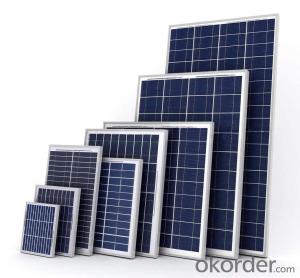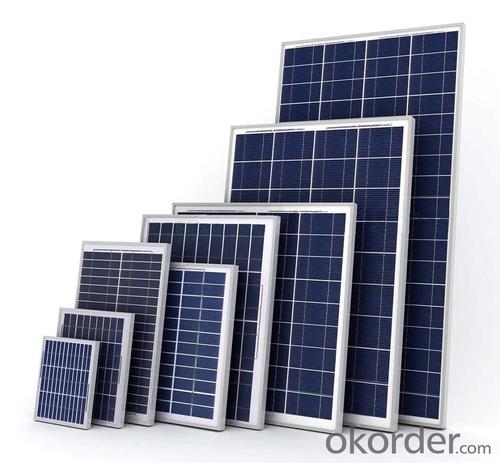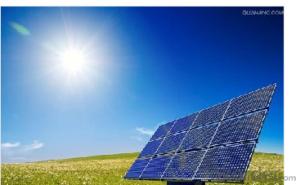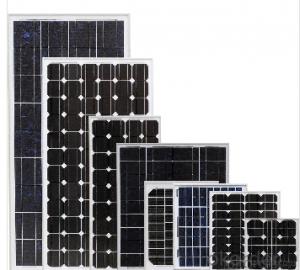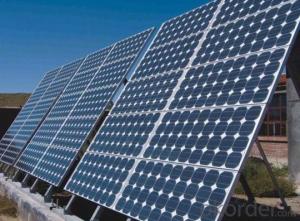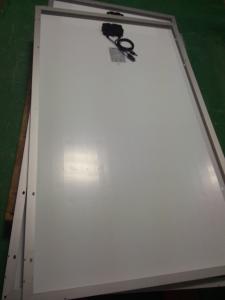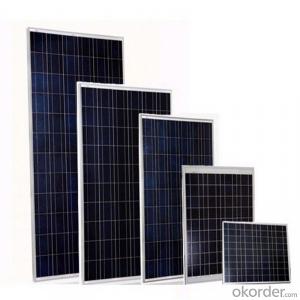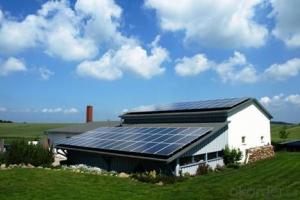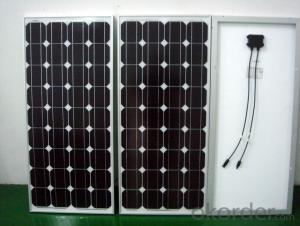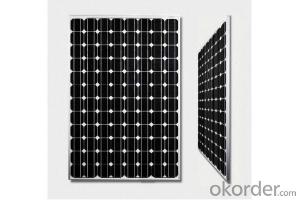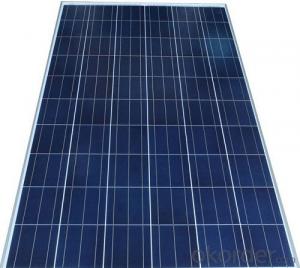CE and TUV Approved 240W Poly Solar Panels in Visakhapatnam
- Loading Port:
- Shanghai
- Payment Terms:
- TT OR LC
- Min Order Qty:
- 10000 watt
- Supply Capability:
- 20000000 watt/month
OKorder Service Pledge
OKorder Financial Service
You Might Also Like
Specification
1. The Introduction of Solar Module
Solar modules use light energy from the sun to generate electricity through the photovoltaic effect. The majority of modules use wafer-based crystalline silicon cells or thin-film cells based on cadmium telluride or silicon. The structural (load carrying) member of a module can either be the top layer or the back layer. Cells must also be protected from mechanical damage and moisture. Most solar modules are rigid, but semi-flexible ones are available, based on thin-film cells.
2.Technical Parameter
Type | CNBM Solar Polycrystalline Series |
Materials | Silicon |
Guarantee | 12 yrs free from defects in materials and workmanship No less than 90% within 10yrs and no less than 80% within 25yrs TUV(IEC61215&IEC61730), CE, UL |
Application | Photovoltaic/ solar/ green energy/ energy saving |
Descriptions | 1.High efficiency crystalline silicon solar cell. Even if under the weak light, the solar module can produce maximum power output. 2.Tempered glass (toughened glass): Anti-reflecting coating and high transmission rate glass increase the power output and mechanical strength of solar module. 3. EVA and TPT: Using high quality EVA and TPT to prevent destroying and water. 4. AI frame: Without screw, rner connection. 6 holes on the frame can be installed easily. 5. Junction box: Multi function junction box with water proof. 6. Long lifetime: ≥25 years; Less power decrease. 7. Good performance of preventing from atrocious weather such as wind and hails. 8. Resisting moisture and etching effectively, not effected by geology. 9. The certificate issued by international authority: UL, TUV, IEC, CE.
|
Packaging Details: | 26pcs/pallet, 28pallets/ 40HQ Our solar panels are packed in cartons, and then pallet. Shipping by sea or by air are both ok, it up to customer’s chose. We’d like to inquiry the freight cost for customer after be informed exact quantity and destination address. |
3. Application and Pictures of Products
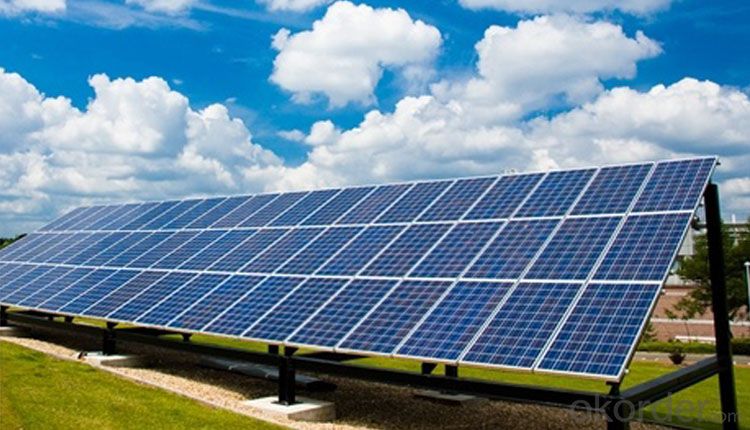
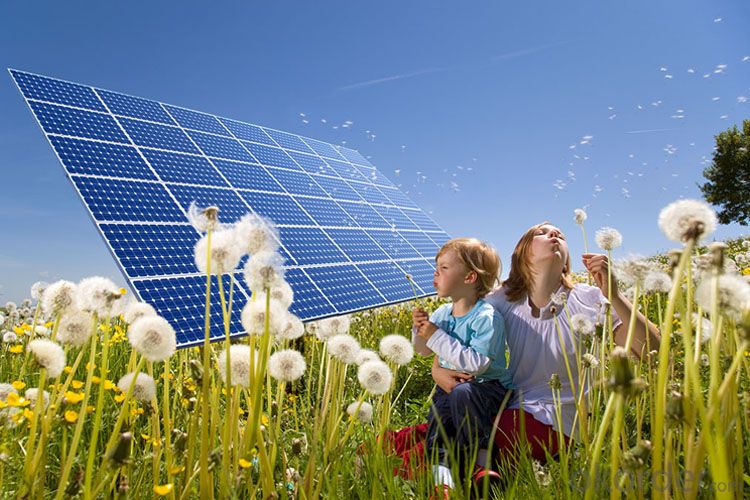
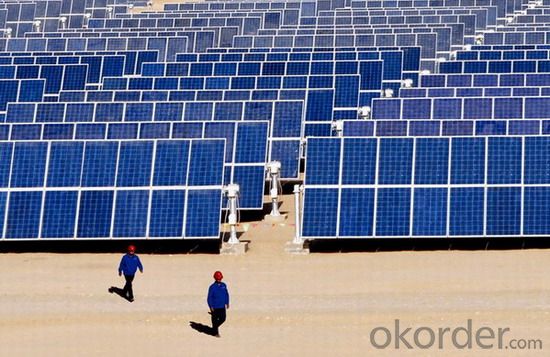
4. How to Work
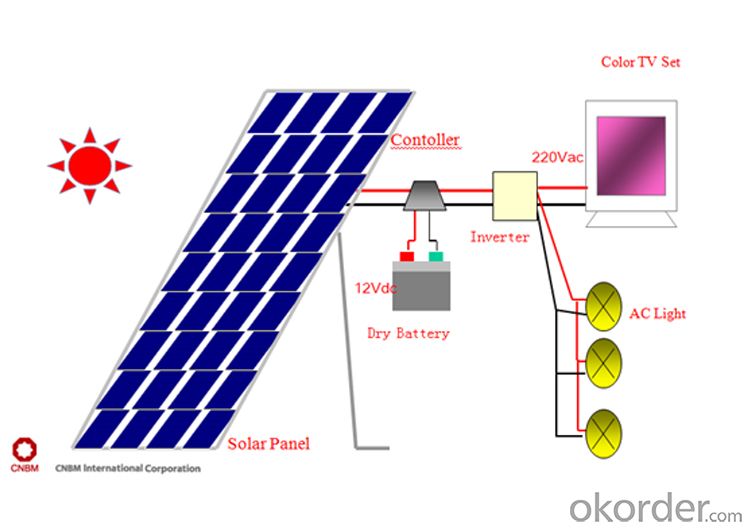
5. Packing Details
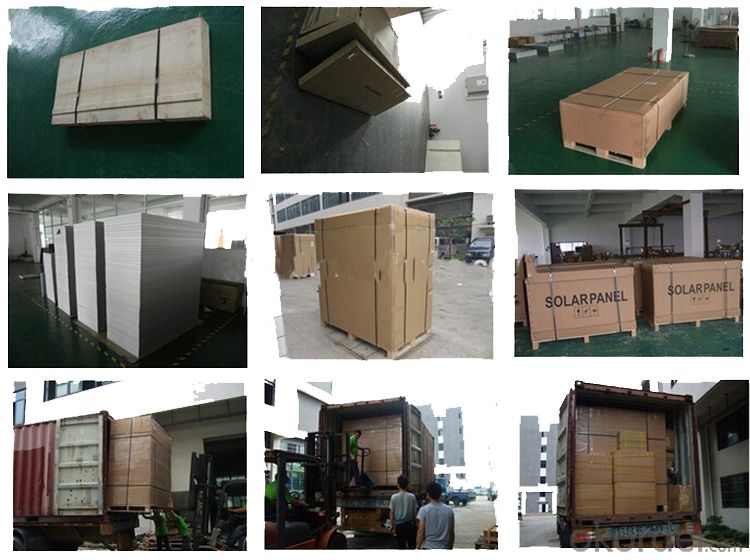
6. FAQ
Q1: What is the business type for the company?
A1: We are one of the biggest manufacturers in zhejiang.Chnia. Which is a high tech PV enterprise dedicated to the research, development, production and sales..
Q2: How long solar panel warranty can you offer?
A2: 10-Year product warranty,25-year linear power output warranty
If there is any quality problem, we will pay for freight and send free parts to you.
Q3: How many certificates do you have?
A3: We have 16 certificates,such as CE, TUV, UL, and so on.
- Q: What is the impact of roof color on solar panels' performance?
- The impact of roof color on solar panels' performance is minimal. While a lighter-colored roof may reflect more sunlight onto the panels and potentially increase their efficiency, the difference is generally negligible. The key factors that affect solar panel performance are the angle, orientation, shading, and cleanliness of the panels, as well as the overall quality and technology of the panels themselves.
- Q: Can solar panels be used for heating water?
- Yes, solar panels can be used for heating water. Solar water heating systems utilize the sun's energy to heat water for domestic or commercial use. These systems typically consist of solar collectors, which absorb sunlight and convert it into heat, and a storage tank to store the heated water.
- Q: What about sources for straight forward solar powered products? Excluding toys, garden frogs and outdoorpath lights I have found few useful items for the home. What I have found are solar panels for under $00 each, inverters, rechargeable indoor lights and a few camping/RV products that are interesting. It seems to me that these could help me start to wean the family off the power company. I can't afford to go cold turkey and cover my roof with solar panels and I don't think the HOA would allow me to even if I could. Is anyone using solar on a small scale?
- I have an active solar heater on my roof. During the winter it comes in handy and heats the house, though we still need to use a gas heater to get the temperature up to a comfortable level.
- Q: Can solar panels be installed on water pumps?
- Yes, solar panels can be installed on water pumps. Solar-powered water pumps are becoming increasingly popular and are a sustainable solution for providing water in remote areas or off-grid locations. These pumps use solar energy to power their operation, making them environmentally friendly and cost-effective in the long run.
- Q: I have a solar panel, charge regulator, inverter....is that all I need to tie it into my grid? Do I just plug the solar panel into the charge regulator into the inverter into any 0v outlet? I feel like im missing something....
- No don't do that unless you want a fire or worse electricution . DO NOT PLUG INTO THE WALL . st solar panel 2nd regulator 3rd 2 volt battery 4th inverter . The inverter should have 0 volt terminals that look like the plug on the wall . You would plug your TV or light into that the inverter . You would need an electrition to hook into your home electrical system . They will hook up a device made to tie into the grid or your meter that will make it run backwards but it takes alot of solar panels too do that . Please do not plug into wall .
- Q: How do solar panels affect roof maintenance?
- Solar panels can have both positive and negative effects on roof maintenance. On the positive side, solar panels can provide an added layer of protection to the roof by shielding it from harmful elements like UV rays, rain, and snow. This can help extend the lifespan of the roof and reduce the need for repairs. However, solar panels can also make roof maintenance more challenging as they need to be regularly cleaned and inspected to ensure optimal performance. Additionally, any repairs or maintenance work on the roof may require temporarily removing the panels, adding an extra step to the process.
- Q: Installing solar panels requires a big initial investment. Before I make this investment I want to check to see if the money I will save by installing solar panels will actually pay for this investment, in the long run. To calculate my savings, we should consider the area (square feet) I currently have available to install solar panels. Look at the available sunlight and its intensity in my state each month of the year. Based on this data estimate how much energy my solar panel will generate. Then compare that with how much energy (kWh) I currently consume based on my electricity bill.
- Your school spend $0,000 per month or per year?? Photovoltaic (Solar Panel) panels have a really large initial capital investment. If you live in a location (e.g. West Coast Desert, SoCal) where there are many sunny days so you might be able to break even quicker. Also note ,there are state and federal grants that can help ease the capital cost. Energy demand keeps going up so expect our current rates to double. People who have alternative forms like wind and solar will have the advantage when this time comes. Just think of when the US had it's oil crisis in summer of 2008, people with small efficient vehicles such as Prius's didn't feel the price increase like the people who bought cheaper large SUV's.
- Q: Can solar panels be installed on boats or RVs?
- Yes, solar panels can be installed on boats or RVs. In fact, they are increasingly popular as a renewable energy solution for these mobile vehicles. Solar panels on boats and RVs can help generate electricity for various applications, such as powering appliances, lighting, or charging batteries. They provide a sustainable and cost-effective way to harness solar energy while on the move.
- Q: How can solar panels be used for heating water?
- Solar panels can be used for heating water by capturing sunlight and converting it into electricity. This electricity can then be used to power heating elements or heat pumps that warm up water for various purposes, such as domestic use or swimming pools.
- Q: What is the most efficient solar panel, how many would we need to power the United States, and how much land would it take?
- Annual power consumption in the US is approximately .2*0^5 Watt-hours. The average solar panel can generate 80W continuously. We can break up the calculation into parts: .2*0^5 Watt-hours per year 925 hours per year .3*0^ continuous watts 80W per panel 64383566 panels 000 sq. inches average solar panel area 650 million square miles (!!!) To give you a better idea, the total surfacre area of the United States of America is 3 million square miles. The surface of the earth is 96 million square miles. Not even 3 planets full of solar panels would be enough. Maybe it is easier for people to start using electricity more responsibly?
Send your message to us
CE and TUV Approved 240W Poly Solar Panels in Visakhapatnam
- Loading Port:
- Shanghai
- Payment Terms:
- TT OR LC
- Min Order Qty:
- 10000 watt
- Supply Capability:
- 20000000 watt/month
OKorder Service Pledge
OKorder Financial Service
Similar products
Hot products
Hot Searches
